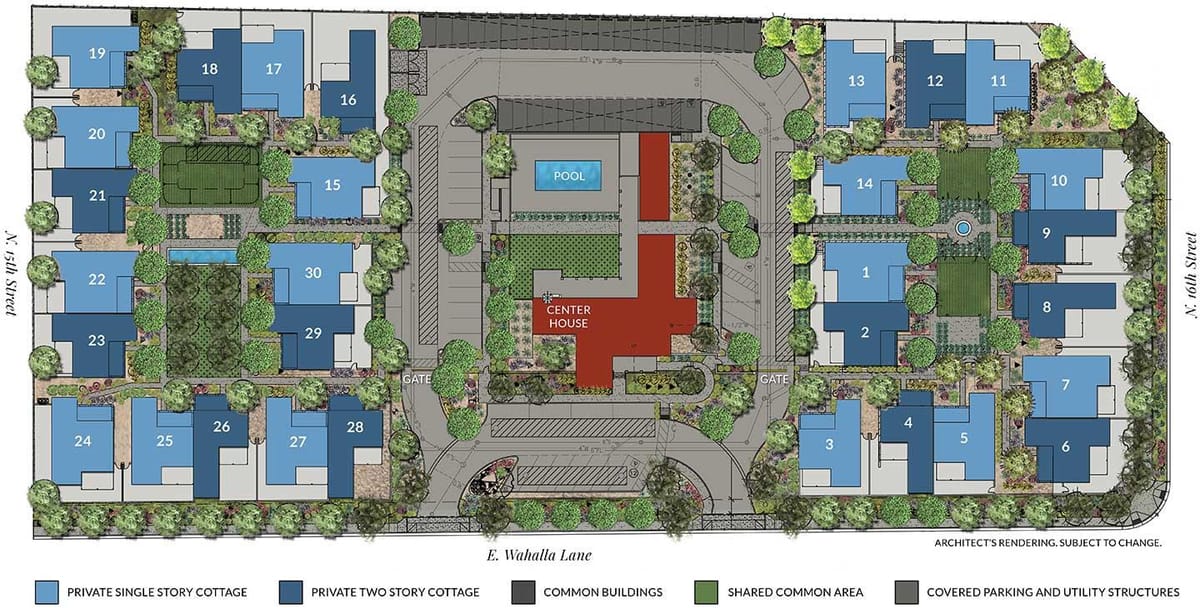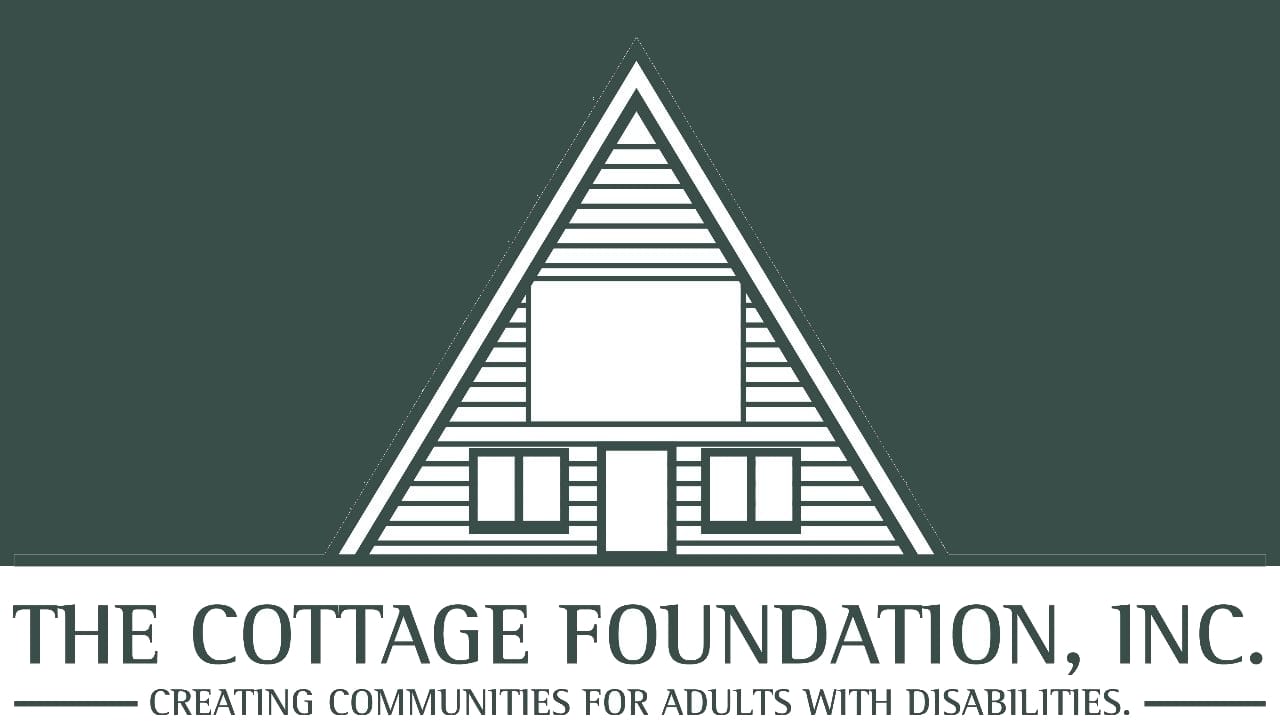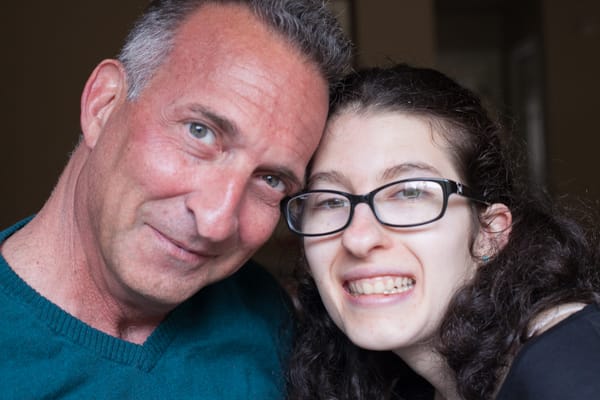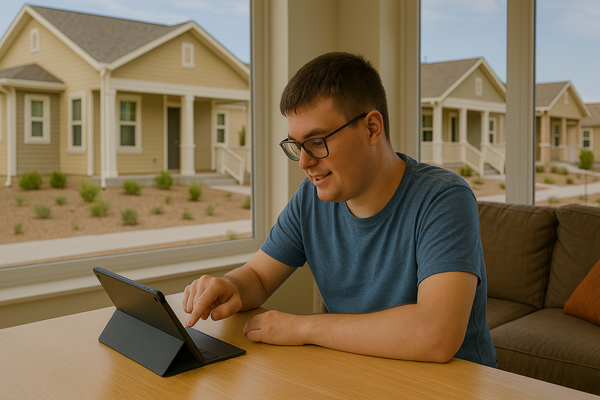Special Needs Housing and the Benefits of Owning a Home in a Supportive Neighborhood

A friend recently asked me how our Phoenix project, Luna Azul, compares to existing housing options for adults with special needs. I told her that, although many housing solutions exist for individuals with intellectual and developmental disabilities, none offer the same advantages as our project. This is why I was so passionate about developing Luna Azul and am now hoping to create similar communities.
The most unique aspect of Luna Azul is its ownership component, which provides two significant benefits—permanence and cost predictability—along with many smaller advantages. These benefits stand in stark contrast to rental models, which often leave families with uncertainties and limited control over their living situations.
The Importance of Ownership
Owning a home has key benefits that are not present in rental housing. For example, when renting, there’s always the possibility of increasing rents, property sales, or a change in the rental terms. This uncertainty can lead to anxiety for families trying to plan long-term care for loved ones with special needs. What if the owner of the rental property decides to sell? Or what if rent increases beyond what the family can afford? The lack of permanence can be a significant source of stress.
If my daughter or her Special Needs Trust were renting, we would have no equity in the property and limited control over who she lives with or the caregivers she interacts with. These concerns are particularly troubling since most rental models involve services that may fluctuate in quality, leaving families in a vulnerable position. If services deteriorate after a move-in, the only option might be to relocate again—a disruptive process that could prove difficult for someone with special needs.
This problem worsens with time. If I’m no longer able to assist my daughter in the future, who will help her find a suitable living arrangement? Will she become a ward of the state, or a burden on her sibling? I’ve spent many sleepless nights worrying about this. The ownership model solves these issues by offering a permanent and predictable housing situation.
By owning the home, typically through a Special Needs Trust, the family has a fixed, manageable cost over time. The family also builds equity in the property, ensuring that it remains a long-term asset. And the family can themselves control the process of choosing roommates and caregivers. This level of flexibility greatly reduces the risks of institutional neglect or abuse, which can be more prevalent in rental properties.
Community Living vs. Isolated Housing
Another major advantage of ownership is the ability to create a community of like-minded individuals. Some parents buy homes for their adult children with special needs to secure long-term housing and avoid the uncertainties of rental markets. While this approach offers some peace of mind, it can lead to isolation if the home is situated in a neighborhood with predominantly neurotypical residents.
Living alone in a traditional home or condo surrounded by people who don’t share similar challenges can be difficult for adults with special needs. My daughter, for example, would likely feel out of place among typically developing adults. While some neighbors might be welcoming, others might be indifferent, or worse, antagonistic. At worst, she might face isolation or bullying, with few opportunities to connect with others who understand her needs.
Moreover, living in such a setting would require significant effort to access social and recreational activities. My daughter would need constant transportation, often at considerable cost, and it could be challenging to find rides that fit her schedule. This arrangement could ultimately trap her in her own home, limiting her life and independence.
In contrast, a neighborhood like Luna Azul—designed specifically for individuals with special needs—creates an environment where residents are surrounded by peers who understand their challenges and strengths. My daughter feels comfortable in our community, where she interacts with others who share similar life experiences. These social connections are critical, as individuals with special needs often thrive in environments where they feel understood and accepted.
At Luna Azul, my daughter enjoys greater independence, as she has easy access to friends, recreational activities, and community events. She walks around the neighborhood, visit friends, or spends time at the clubhouse. These opportunities for social interaction are invaluable, offering her a sense of belonging that would be difficult to replicate in a typical neighborhood.
Additionally, the close-knit nature of the community at Luna Azul means that residents can share transportation costs and other expenses, helping to reduce financial burdens. This makes the community even more supportive, both emotionally and financially.
Why Luna Azul Works
While owning a typical home in a traditional neighborhood might provide some of the benefits of ownership, Luna Azul offers a sense of community that traditional neighborhoods cannot. A special needs community like Luna Azul brings together individuals with similar life challenges, allowing for stronger bonds and mutual support. This setting encourages residents to interact with others who truly understand their needs, promoting more fulfilling social and recreational opportunities.
Furthermore, the opportunity to choose roommates and caregivers is essential for families looking to ensure that their loved ones are living in a safe and supportive environment. Luna Azul provides families with the flexibility to make these choices, which is not always possible in a rental or institutional setting.
For my daughter, owning a home in a community designed with people like her in mind offers the best possible solution. It provides her with the independence, security, and companionship that are essential for a fulfilling life. At Luna Azul, she will be surrounded by friends, share experiences with peers, and build relationships that will enrich her life. As a parent, this gives me peace of mind, knowing that she is in a safe, supportive, and thriving community.
By developing communities like Luna Azul, we are not only addressing a critical need for families but also creating lasting, sustainable solutions for individuals with special needs. Our mission is to provide a permanent home and a community where residents can live with dignity, independence, and joy, surrounded by people who care about them.




